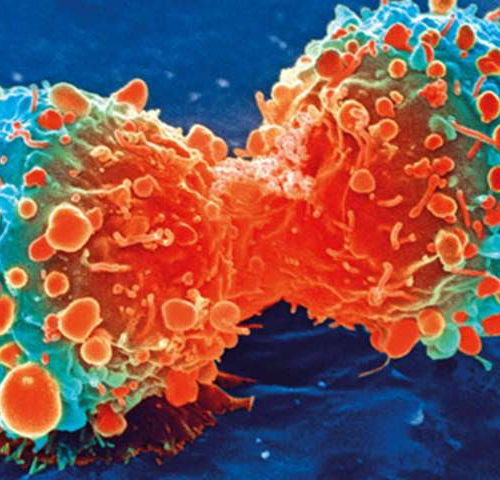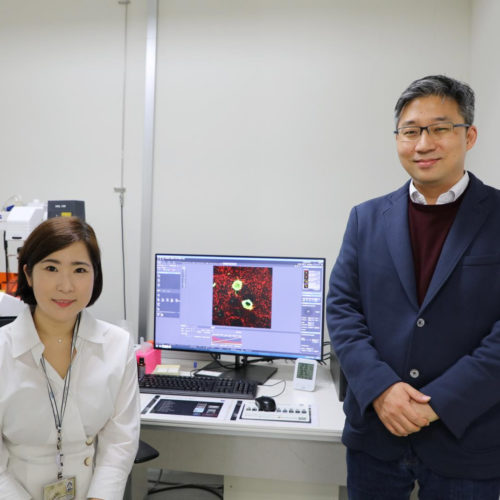by University of Pittsburgh Chief of the Division of Infectious Diseases at the University of Pittsburgh and UPMC. University of Pittsburgh School of Medicine scientists have discovered the fastest way to identify potent, neutralizing human monoclonal antibodies against SARS-CoV-2, the virus that causes COVID-19. The method—as well as a trio of successful animal studies on an...
Cancer treatment could be replicated for COVID-19
by Candy Gibson, University of South Australia Cancer cell during cell division. Beta-blockers could potentially be used to treat COVID-19, according to a new international study by Italian and Australian scientists. University of South Australia cancer researcher, Dr. Nirmal Robinson, working with a team in Naples, has found evidence in animal models that the beta-blocker Propranolol...
Could an antibody drug help you shed pounds?
by Amy Norton, Healthday An experimental antibody drug that targets one of the body’s key metabolism regulators may help obese people lose weight—at least briefly. That’s one finding from an early study that tested the injection drug, which mimics the effects of a natural hormone called fibroblast growth factor 21 (FGF21). In the body, FGF21...
Abnormal blood pressure levels while sleeping increase risk of heart disease, stroke
AMERICAN HEART ASSOCIATION DALLAS, Nov. 2, 2020 — People who experience high blood pressure while sleeping are more likely to experience future cardiovascular disease especially heart failure, even when their daytime blood pressure is within normal ranges, according to new research published today in the American Heart Association’s flagship journal Circulation. Health care professionals typically use in-office and...
Age is a primary determinant of melanoma treatment resistance, two studies find
JOHNS HOPKINS MEDICINE IMAGE: ASHWANI WEERARATNA, PH.D. v Age may cause identical cancer cells with the same mutations to behave differently. In animal and laboratory models of melanoma cells, age was a primary factor in treatment response. Cancer has long been known to be a disease of aging, with 60% of cases and 70% of deaths occurring...
Molecular interactions regulating trans-synaptic signalling and synapse formation
DGIST (DAEGU GYEONGBUK INSTITUTE OF SCIENCE AND TECHNOLOGY) IMAGE: PROF. JAEWON KO (RIGHT) AND THE FIRST AUTHOR DR. KYUNG AH HAN (LEFT) Scientists at Korea’s Daegu Gyeongbuk Institute of Science and Technology (DGIST) and colleagues have uncovered some of the complex molecular mechanisms involved in the formation of the brain’s neural circuits. Their findings were...
Ultrapotent COVID-19 vaccine candidate designed via computer
UNIVERSITY OF WASHINGTON HEALTH SCIENCES/UW MEDICINE IMAGE: ARTIST’S DEPICTION OF AN ULTRAPOTENT COVID-19 VACCINE CANDIDATE IN WHICH 60 PIECES OF A CORONAVIRUS PROTEIN (RED) DECORATE NANOPARTICLES (BLUE AND WHITE). THE VACCINE CANDIDATE WAS DESIGNED USING METHODS DEVELOPED. An innovative nanoparticle vaccine candidate for the pandemic coronavirus produces virus-neutralizing antibodies in mice at levels ten-times greater...
Artificial intelligence is being trained to predict whether someone is likely to develop oral cancer
The diagnosis of oral cancer could be ‘revolutionised’ by using artificial intelligence to predict whether someone is likely to develop the disease, experts have said. Experts led from the Universities of Sheffield and Warwick have teamed up to investigate how machine learning could be applied to aid doctors in early detection. Diagnoses of oral cancers...
Vitamin B3 protects skin cells from the effects of UV exposure, new research finds
SAY COMMUNICATIONS LUGANO, 31 October, 2020 – Research presented today at EADV’s 29th Congress, EADV Virtual, shows hope that a form of vitamin B3 could protect skin cells from the effects of ultraviolet (UV) exposure: the main risk factor for non-melanoma skin cancers (1). Researchers in Italy isolated cells (human primary keratinocytes) from the skin of patients with...
Study supports link between traffic-related air pollution and mental disorders
by King’s College London Researchers at King’s College London, Imperial College London and University of Leicester have found first UK evidence that adults exposed to high levels of traffic-related air pollution are more likely to experience mental disorders. The study is funded by the National Institute for Health Research (NIHR) Maudsley Biomedical Research Center (BRC) and...







